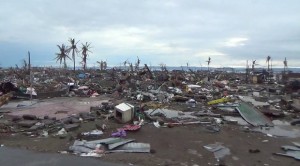‘Yolanda’ child survivor no longer fears rain but needs to be ready for next disaster
MANILA, Philippines — When asked to draw how Supertyphoon “Yolanda” (international name: Haiyan) had affected her and her family, a 7-year-old survivor in Tacloban city drew a picture of her family’s destroyed home, the school ruins, fallen coconut trees, and a pile of bodies.
“Children should not go through those sorts of experiences,” Richard Sandison, Emergency Response Manager for Plan International, said as he shared with reporters the children’s stories on how they coped with Yolanda’s aftermath nearly a year ago.
Sandison however said the same child today who used to be “afraid of the rain, the wind and the sea” is now “able to play in the rain”.
And this has happened even before the first anniversary of Yolanda, recorded as the strongest typhoon to hit land in recent history.
It was a recovery, Sandison said that he found “quite astonishing”. “But that picture she drew will remain in my memory forever.”
Article continues after this advertisementFuture of Disaster Preparedness
Article continues after this advertisementDespite being the most vulnerable to disaster, children are the most important sector to take care of in the immediate aftermath of any calamity, according to Plan International Philippines’ country manager Carin van der Hor.
“The children of today are the adults of tomorrow and the better they are prepared now, they better they can prepare [for future disasters]. They can also use their influence on the duty-bearers, the government and their parents, to make sure that their communities are safe,” Hor said.
“If we fail to teach them, we are looking at many, many more generations of high-levels of casualties and a lot of damage to infrastructure. We would be facing generations of wasted potential. But lets not go that way, lets not fail to teach them,” she said.
Hor stressed that children needed to be taught disaster preparedness and other skills that would help them when future calamities hit the Philippines.
“Whatever skills we teach children now are life skills that they will take with them for the rest of their lives, so that’s why its important,” Hor said.
“This is the new normal, there will be more disasters, and the Philippines will always be one of the most disaster prone countries, there is no way that we can change that,” she said.
Aside from the fears that children have with regards to the weather, they also experience various stressors as evacuees.
Children of disasters told Plan International about their problems on not having enough shelter, food, water. Many realize the importance of going back to school and regaining a sense of normalcy.
“They want to go to school because they want to reconnect with their friends and they want to somehow get their lives back to normal, not just sit around and think about what happened,” Sandison said. “They wanted to start rebuilding their dreams.”
Yolanda struck provinces in the Visayas region last Nov. 8, 2013, displacing millions and leaving more than 6,000 dead.
To this day, the hard-hit provinces of Eastern Samar and Leyte are still recovering from the disaster.
RELATED STORIES
‘Yolanda’ survivors grieve for kin whose bodies were never found
Love offers fresh dreams for Philippine typhoon survivors
‘Yolanda’ widow grateful for cruel consolation
RELATED VIDEOS
